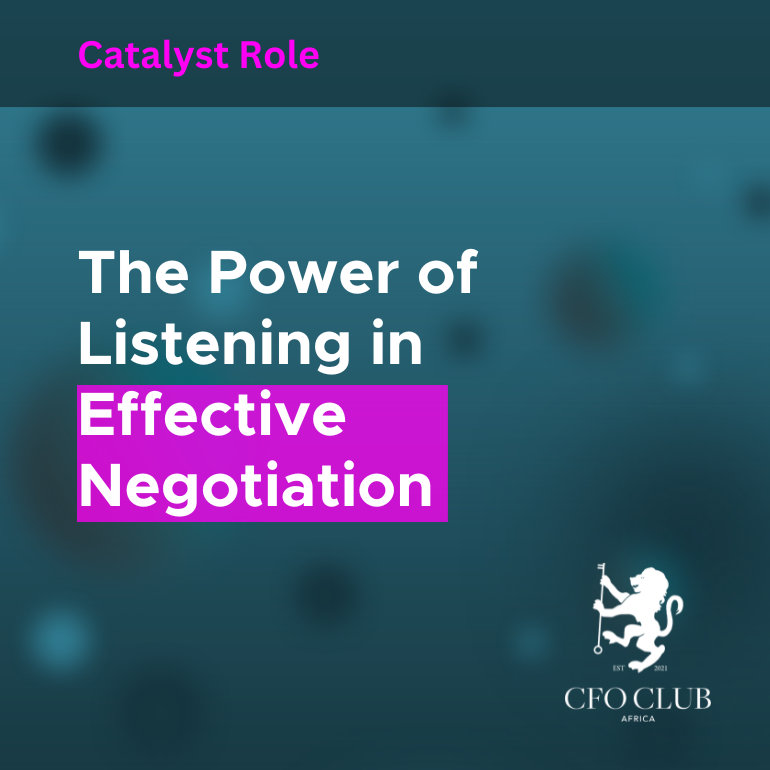The Power of Listening in Effective Negotiation
When it comes to negotiation, people often think of strong arguments, clear facts, and the best pitch. But here’s the twist—real negotiation power often lies in something much quieter: listening.
Listening is more than a soft skill; it’s a secret weapon. In a role filled with financial data, strategic meetings, and high-stakes decisions, active listening can drive better outcomes and turn tough conversations into collaborative wins. Here’s a closer look at why listening is so powerful in negotiations and how to make it work for you.
Why Listening Matters
Imagine this: you’re in a negotiation with a key supplier, aiming to lock in favorable terms for the coming year. You could jump straight into numbers, but there’s a risk—they might tune out, push back, or even disengage. Now, think about the alternative. What if you began with a few well-chosen questions, then really listened?
Building Trust
When you listen, it shows respect and understanding, making the other person feel valued. And, let’s face it, people are more likely to work with those they feel comfortable around.
- Uncovering Hidden Interests
Listening reveals what’s under the surface. Maybe your supplier has a cost issue or a deadline pressure you didn’t know about. Understanding their needs can help you tailor your offer so both sides walk away satisfied. - Improving Clarity and Reducing Conflict
Active listening clears up misunderstandings early on, making it easier to avoid potential roadblocks. Plus, it lets the other party feel heard, which naturally reduces friction.
Practical Tips for Listening Like a Pro
So, how do you make listening work in a negotiation? Here are a few steps to turn that good intention into powerful practice:
1. Start with Open-Ended Questions
Kick off the conversation with questions that encourage the other person to open up. Try asking, “Can you walk me through your priorities for this deal?” or “What challenges are you currently facing?” Questions like these invite them to share, giving you valuable insights right from the start.
2. Master the Art of the Pause
Silence can be golden in a negotiation. Instead of rushing to respond, give yourself a moment to absorb what’s been said. This pause shows you’re genuinely considering their input and lets you gather your thoughts for a stronger reply.
3. Summarise and Reflect Back
After they’ve shared, briefly summarise what you heard. For example, “It sounds like flexibility with payment terms would help your cash flow—did I get that right?” Reflecting back shows you’re engaged and helps confirm you’re both on the same page.
4. Watch for Non-Verbal Cues
Sometimes, what isn’t said can speak the loudest. Notice body language, facial expressions, and tone of voice. If they seem hesitant or uncomfortable, that’s a clue to dig deeper or clarify.
5. Keep Your Ego in Check
Negotiation can trigger our competitive side, but staying humble opens more doors. Avoid thinking about your next argument while they’re talking. Instead, focus fully on what they’re saying—it’s surprising how much you’ll learn.
Examples from the CFO World
- Dealing with Teams
CFOs frequently negotiate with internal teams over budgets, resources, and targets. Listening here can help uncover potential roadblocks early, allowing you to offer solutions that team members might not have thought of.
- Working with Vendors
Vendors want to feel appreciated, not cornered. By listening, you can often negotiate favorable terms without straining the relationship, keeping lines of supply and goodwill strong.
- Navigating Board Discussions
In a boardroom setting, listening is crucial for effective decision-making. Directors bring varied perspectives, and being open to their insights can help you build a more strategic approach that aligns with broader company goals.
Closing Thoughts: Listening as a Skill to Cultivate
Effective listening isn’t just a “nice to have” in negotiation; it’s a must-have skill for any CFO looking to build strong partnerships and get results. By listening actively, asking thoughtful questions, and picking up on subtle cues, you’ll find that even the toughest negotiations become smoother and more successful.
So, next time you’re in the room, give yourself permission to pause, listen, and absorb. You might be surprised at how much power there is in staying quiet.

